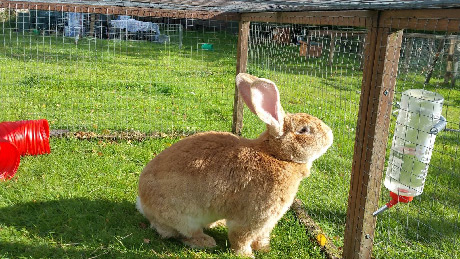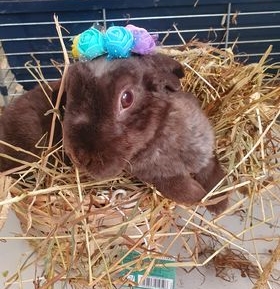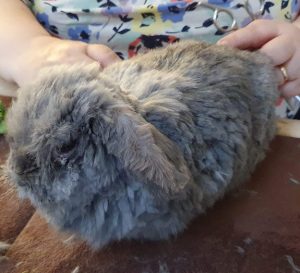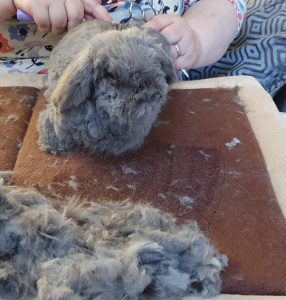What is FLYSTRIKE in rabbits & guinea pigs? What can we do about it?
“Flystrike is a painful and sometimes fatal condition caused by flies laying their eggs on another animal. These hatch into maggots; this can happen within hours of contact with a bluebottle or similar fly. The eggs laid will hatch and maggots form which eat the flesh of their ‘hosts’. This could be your rabbit or guinea pig. If your pet becomes infested, ask a vet for help immediately.” RSPCA
What causes Flystrike?
-
heat, warmer weather
-
a poopy bum
-
dirty living environment
-
flies of course
Prevention: by ensuring the hair of the bum is short, is clean, if possible keeping the temperature cool and using “fly guard” just in case like sunscreen but for rabbits and guinea pigs to prevent flies from laying eggs which can hatch into maggots.
Applying fly guard to the lower half of your pet can limit the potential problem of fly strike for an 8-week period. Some vet care plans will have this treatment built in. You can buy over-the-counter products and treat your pet yourself such as Fly Guard.
At Furry Friends Hotel we ensure all our own pets are treated for Flystrike. If you would prefer, we can also offer a Flystrike prevention treatment for your pet.
If you book your pet in as a day case we will adopt a professional approach to checking the groin and bum is clean of your pet and will clear any faecal risk in addition to applying a preventative treatment.
Please check out www.furryfriendshotel.co.uk and press the blue book now button and choose appointment, select Flystrike Prevention.
Each pet can be dropped in at 11 am with pick up after 4 pm. They will be allocated a treatment hutch with access to hay, feed and water throughout. The treatment will provide protection for up to 8 weeks.
It is important to note that the treatment applied will prevent fly eggs from hatching. However, these alone are no substitute for ensuring that your rabbit/guinea pig is healthy enough not to become susceptible in the first place. They cannot be relied upon to replace regular checks of your pet’s bottom. Daily checks are crucial to prevention. Organise treatment now to help prevent a nasty infestation. avoiding unnecessary pain, and risk to the health and well-being of your pet.
Making your garden Rabbit Friendly
Rabbit-Friendly Garden blog
As we approach spring and summer you may be thinking about giving your garden that annual makeover. Well, this year why not try and make it bunny friendly so you can both enjoy some time outside in the sun!
- Fencing
Firstly, we need to make sure those escape artists can’t get too far so fencing is essential! If you are not as keen on the standard wooden fence, you could spruce it up with a hedge fence – of course with a wire mesh inside so they can’t run through it! Alternatively, you could section of part of your garden if that’s easier for you to manage.
- Graze-safe garden
We know our rabbits love to nibble on grass, so we want to make sure it’s safe for them. We don’t want any pesticides or fertilisers on it as this could be toxic for them! For the nibblers out there – artificial grass may not be the option however some bunnies do just fine on it.
- Beautification
Now that we have our area secured and fenced off – it’s time to add something to spruce it up! Flowers and plants are the perfect way to add the finishing touch to your new bunny friendly garden. Most importantly we need to make sure everything we are putting in it is rabbit friendly – nothing toxic! Here are just a few examples of toxic plants that you would not want to find in the garden of a free ranging bunny.
Plants which are toxic to bunnies: Avoid these plants.
- Azalea
- Bluebell,
- Cherry Laurel,
- Daffodil,
- Foxglove,
- Honeysuckle,
- Hydrangea,
- Peony,
- Sweet Pea
- Tulip.
If you want to read more why not visit , www.pdsa.org.uk websites here you can find more information on toxic plants to avoid.
You may be thinking, what can I plant ? Here are a couple of options for your rabbit- friendly spring and summer garden.
Rabbit-friendly plants:
- Brunnera
- Forget Me Not
- Ox Eye Daisy
- Wallflowers
- Pinks
- Mint
- Nepata
- Roses
Hanging baskets and sectioned off flower beds are the perfect idea to allow you to have lovely plants that are safe from your bunny eating them. You can make other edible plants more accessible to your rabbit to have a nibble on.
- Enjoy
Finally, there is nothing better than watching your happy bunnies binky and run around. Why not add some of your bunny’s favourite hideouts, tunnels, and toys? I am sure they will thank you for it!
Happy Gardening!
Ref: Gardening with Rabbits by Twigs Way 2022 Rabbit Welfare Association and Fund
Fun and boredom breakers for rabbits
Boredom-breakers-for-rabbits
(Guinea Pig Information and Advice in a following post later in April)
Perhaps you have had your pet a little while ago and now the novelty is meeting to an end. When you leave your home you find your bunny comfortable and relaxed, and when you return home you still find him in the same situation. You may think your bunny is boring and is not like other pets that keep playing and look enchanting.
You are wrong! Your bunny needs you to provide something joyful and playful that can keep him busy and active all the way when you are away.
Rabbits are energetic and also want to have fun like dogs and cats and even us humans. Sometimes a roll of toilet paper is enough to do this job.
All rabbits have a great sense of curiosity and if they are not allowed to be active boredom and depression can quickly develop in them. This can lead to behavioural problems.
Bored rabbits are very likely to be mischievous. They love to explore. So there might be things like the underside of the couch and hanging electrical cords for them to explore and inspect which you should tuck out of the way to be safe.
Your bunny will not fall into boredom if you keep offering him stimulating activities which can take him a long way toward enjoyment. Any kind of excitement will drive the rabbit away from places to avoid.
Haylofts, boxes and tunnels of cardboard, hidden areas, string balls, wheels of hay, willow baskets, seagrass mats, paper towel tubes stuffed with hay, are all most favourite items for a bunny to remain busy.
Most of the items listed here are consumables. Don’t forget your bunny is most likely to eat, chop, and gradually destroy carpets, cardboard, and balls. However, you need to stop him to consume things made of plastic.
These things are called boredom breakers. Let’s explore some of them.
Bunny Boarding:
Bunny boarding is an excellent way as boredom breaker if you cannot take care of your bunny for a specific period of time. Rabbit hotels have been saving rabbits and improving their lives for many years. These hotels are making the world a better place for rabbits.
Whenever you plan to go on vacations or have formal or informal events where you are unable to stay with your bunnies and take care of them, experts make sure to handle them professionally in a safe, comfortable, and fun environment in these hotels.
They provide loving care with all the essential things to make them healthy, happy, and joyful. Your bunny can have an ideal environment by having their favourite
k foods and fun activities. Just make sure to inform and provide all the things and medications to the staff which are necessary for your bunny’s health and well-being.
Give them a place to play and have fun.
Like cats and dogs, rabbits love to play and have fun with their toys. For the most part, their favourite game is the toy box. To keep them away from getting bored with the same toys, you should replace them from time to time and put them in different places such as the garden, in their run, and in the living space.
Many people who own rabbits are surprised to know about their pets which are just so interesting and playful. Most rabbits like to choose simple and interesting toys, such as paper boxes or empty rolls of tissue paper.
Toys keep your rabbit healthy and keep it from getting bored. Bored rabbits are more prone to be depressed, destructive, obesity, and can be victims of many diseases. Without toys and playful equipment, rabbits will turn their attention to your furniture, belongings, and even dangerous things like electric cords as chew toys.
Try different types of toys to find the right one for your rabbit and give him new ones on a regular basis. Try finding out what they like the most to play and what things make them more active and smart.
The benefits of rabbit toys:
Enrichment refers to the activities of the animals that make them think. Rabbits that received mentally stimulating activities are happier and healthiest than the bored and less active rabbits. That’s why it’s so important to enrich your rabbit with fun-producing things and toys. Picking things up, crawling over items, or using the mind to hide in hidden places, are the various and simplest ways to provide them with fun opportunities. Just be creative and watch your bunny play and twist your choice of toys and your bunny will jump every day.
Final Words:
There could be an endless list of bunny boredom breakers, one needs to spend a reasonable time to identify which things or items really turned on their creative nature. Try different things with them and they will let you know their favourite ones. Bunny boarding is also one of the best ways that is proven as a boredom breaker for your loving pet bunny
Getting to know your rabbit June Blog 2022
Getting to know your rabbit
So you are now the owner of a rabbit or two, as previously mentioned in our April blog your rabbit will do better and be more stable if they are part of a pair or small group. There are a number of behaviours that are good to understand about your cute cuddly fluff ball.
Hostility: remember your new friend is a prey animal and will be fearful of any newcomers to their surroundings. If they are normally placid and when you approach their behaviour is unwelcoming, a check-up with the vet to ensure there is no pain or underlying medical condition that is causing the reactions.
We all like our own space and protect our home, rabbits are equally territorial, in the wild a rabbit group has a leader, usually a dominant male. If a new rabbit is introduced into another’s home ground and there is an aggressive response from the other rabbit, he is likely to be defending his territory. Neutral ground is always a good start when introducing your furry friends. Seek advice from rabbit rescue or vet services to support good interaction between your rabbits.
Chasing: rabbits run after each other to display their dominance, disputes like in any social group may occur, this is normal, it is important to give rabbits plenty of hutch and run space. A minimum of 6ft by 2ft hutches are recommended with additional run space. Not enough space can lead to unhappy bunnies and fights. Most fights are reported to be between unneutered males, one good reason to have your bunnies neutered.
Female rabbits can exhibit aggression, usually around their food bowls or in the wild nesting areas. Bunny owners may hear grunting or head butting toward their owner. This could be fear, related to bunnies’ natural prey instinct or previous negative experiences
You need to take time to get to know your bunny, wait for them to come to you, they need to see the hand as a friend. You could offer treats as the rabbit approaches you, fresh herbs e.g., parsley, mint, and coriander are best.
More bunnies: well, you know the saying, don’t you? Rabbits can breed from 10 -12 weeks, and a female can give birth every 4 weeks, that’s a lot of bunnies. It is better to see a vet and book them in for a neuter. This allows them to enjoy the companionship of other rabbit friends without pregnancy concerns.
Ill-health: taking the time to monitor your rabbit’s normal eating, drinking, pooping and playtime behaviour can help you know when something is not quite right. Rabbits are good at hiding when they are not well, so if your rabbit’s behaviour changes e.g. they don’t come out and see you at feed time, you need to look further.
You need to ask yourself, is your rabbit being less active? are they looking uncomfortable? Have they stopped eating? are there fewer droppings or watery droppings? Is there excess mucus on their front paws? Are they scratching around the ears all the time? or has your rabbit developed a head tilt? If you are noticing any of these changes a visit to the vet or chat with the veterinary nurse would be advised.
Lack of occupation: your bunny can become stressed and frustrated if they are bored. You may notice constant nibbling of cage bars, digging, and chewing. Improve the environment by creating foraging boxes to support food finding and digging, providing a choice of shelters from cardboard boxes to tunnels. Chew toys can encourage normalized play activity, willow tunnels, acorns, a range of sticks
Summary:
So this cute ball of fluff has to be handled with care, think carefully about its environment and run space. Give thought to who their companions are. Remember rabbits hide their illness well so monitor water intake, and food intake, remember diet should be 80% hay 10% pellets and 10% greens daily. Hay at all times. Look for changes in behaviour and try to understand them, modify your approach, and add enrichments to their living area, this may help. No rabbit is the same, what works for one may not work to settle your rabbit immediately. Don’t give up, trying to understand your bunny and what their body language is saying will create a stronger bond between you and a happier home for all. Look out for the next blog where we will explore small furry first aid remedies.
Reference:
Understanding Your Rabbits Habits:2011, Tamsin Stone
Bunny Rabbits are just not for Easter
Bunny Rabbits are just not for Easter
|
Think again? – Rabbits are a |
It may be that you think bunny rabbits are cute, fluffy cuddly pets, let me tell you they are classed as an exotic species and need special care. So if you are thinking to gift a rabbit, like the one ABOVE this Easter :
| Think again? – Rabbits are a long term commitment and if you truly care for them and want the best rabbit centred care you might think about gifting an easter egg or fluffy toy instead |
So what is rabbit centred care?
Simply put the needs of your rabbit are a central focal point to all that you offer and provide for your rabbit to ensure their well being and quality of life. There are key elements that you need to think about:
- Commitment- rabbits can live over 10 years and need consistent love and care.
- Accommodation – good spacious hutch or room advised not less than 6 foot by 2 foot by 2 foot with access to free running space daily that is rabbit friendly. It needs to be cleaned fully at least once weekly and spot cleaned daily.
- Food and water – rabbits’ diet is 80 per cent hay and 10 per cent nuggets and 10 per cent greens and forage combined. Fresh water at all times
- Mental Stimulation – rabbits need stimulation, they can become bored easily, they are better as a pair as they are socially needy, like us we all need friends and play and chew toys to support well being
- Caring Continuity – rabbits are friendly and sociable, they will bond with you and form attachments, but you need to give them daily one to one time- not just 5 mins
- Carers that are knowledgeable of rabbits’ needs- research your rabbit’s care needs, learn about, bedding, feeding, playtime and stimulation, daily observation of eating, drinking and pooping.
- Veterinary Care – your bunny needs to be vaccinated annually, microchipped, nails clipped, groomed, you need to think about Pet Insurance
If you still think you need a rabbit as a Furry Friend, go first to a rabbit rescue centre where you can offer a rabbit a new start and get expert advice and support to ensure all bunnies get a better start in life. Our local rabbit rescue is : Beloved Rabbits can be found on: https://belovedrabbits.org/
Useful advice can also be found from the Rabbit Welfare Association and Fund on: https://rabbitwelfare.co.uk/
Medication Time
Well this is just another day at Furry Friends Hotel. Our guests not only need fed and watered, sometimes, more intensive support may be required. Little did I know that when embarking on my role as a non medical prescriber that the professional skills gained would be so transferable to ensuring all guests and our own pets get the best care. We always act on pet owners and Vet guidance in the best interests of all our Furry Friends.
Rabbit & Guinea Pig “SPA” Pampering and Grooming
|
February 2021 Issue 1 |
||
| Rabbit & Guinea Pig “SPA” Pampering and Grooming | ||
| Your special small companions need to feel looked after too! Here at Furry Friends, we have the experience to provide grooming with a wide variety of breeds of guinea pig and rabbit companions – smooth, long, backwards, rough, wiry, frizzy, all hair types catered for. We look after every guest furry as if they were part of the family.
“Mike was amazing to our wee Bluebell, she was a little furball but after a few chilled hours at Furry Friends she looked like a rabbit again” G & J Blair ====================================================================== Your small furry friend needs to be groomed regularly. Regular brushing keeps their coat in great condition, preventing the formation of matts which can irritate the skin and lead to infections or the deadly disease flystrike. Particularly in hot weather conditions. Although your pet normally grooms themselves, a regular coat treatment removes excess fur that might be ingested otherwise, and cause problems with hairballs. Lastly, a good brush helps your pet get used to being handled and allows you to check for lumps or bumps that should not be there. In addition to looking after your pet’s coat, on request you can book for their nails to be trimmed and filed During their spa treatments at Furry Friends, we use aromatherapy calming remedies to ensure your pets stay is as stress-free as possible On Day of Treatment We normally arrange for your pet to be dropped off by 11am During their stay they have access to indoor accommodation with fresh hay water and light handling as appropriate. Your pet will not be rushed, we give them plenty of time and go at their pace. At the end of their treatment, Pick up, is usually by 4pm. ====================================== Grooming Service – Aromatherapy treatment – Hair conditioning and cut – £ 20.00 An additional dry Shampoo that can improve the overall well being of your pet and remove unwanted odour and soiling. Recommended if your furry friend is urine staining or bottom soiling – this can make a difference
===================================== Nail Grooming/trimming Most rabbits & guinea pigs in the wild, maintain their nails short with foraging and digging in the undergrowth. Your pets however may need a little extra help to support their nails to be at a healthy length. Nails can be trimmed and filed, particularly needed if the nails are curling. Every effort will be made for safe nail care, however, if there is any history your pet’s nails are sensitive bleeders please inform us prior to treatment. Your pet’s comfort comes first and if they are unduly stressed, treatment will not be progressed. A partial refund will be given if this occurs Nails £15.00 (including aromatherapy calmer) Should a pet arrive with a coat badly matted or very overgrown nails that incur significant treatment time an additional charge will be made. To avoid this we recommend — grooming sessions.at least every 6 to 8 weeks. 1. Spa Grooming session 2. Coat conditioning 3. Healthcare Check 4. Nails trimmed & conditioned |
||
|
|
||
5 Signs that a rabbit is happy and content
1. They take a lot of naps during the day.
Rabbits just like us sleep up to 8 hours a day, they do this differently from us however by taking naps during the day and night, they don’t sleep for 8 hours in one go! So if your rabbit has a nice quiet cosy place where they like to take a nap then you know that they are happy,
If you never see them taking a nap then ask yourself why. Is there too much noise? Do they feel safe? Also, rabbits sometimes nap with their eyes open so they can be taking a nap without you noticing.
2. They establish a routine
Rabbits love routine and if you watch them closely and spend time with them, then you’ll likely learn what their daily routine is, by letting them follow their routine each day you’ll see just how happy your bunny is. Should you ever need to interrupt their routine with visits to the vet or if there is a lot of noise going on in the house or garden, then you’ll notice how this affects your rabbit’s mood. A way they can show their disapproval is by ignoring you.
3. They tell you they love you
Rabbits show affection by grooming, so if your rabbit is licking your hand and or face that is their way of saying that they love you
4. They love their food
Rabbits that are happy look forward to their food. There is nothing quite like watching them munch through their favourite vegetables. If you look closely it’s like they’re smiling when they eat. Another way to tell is if they run off with a treat or vegetable it’s as if they can’t contain their excitement and want to find just the right place to sit and enjoy it. If your rabbit isn’t interested in eating then something may be wrong with them and You should get them seen to by a vet especially if they’ve stopped eating altogether.
5. Their body language is relaxed
Sometimes rabbits will flop if they do this it means that they are really happy and relaxed. A rabbit that is happy and relaxed may also perform what looks like yoga stretches accompanied by a big yawn.
Ciaran’s Blog 1st October 2018
Roger the continental giant loves nose rubs and spending time out in the run.
Oscar the friendly gerbil is such a lovely wee guy so friendly and cute! Loves spending time out of his cage and enjoys cuddles.
Great news we have some new arrivals one of our guinea pigs recently gave birth to three small, furry and cute pups 😍 they’re lively wee things and we look forward to posting regular updates.
Here we have Oscar the gerbil enjoying some time out of his cage and getting some tlc.

And here we have Roger enjoying some time out in the sun.





 07758 317569
07758 317569


